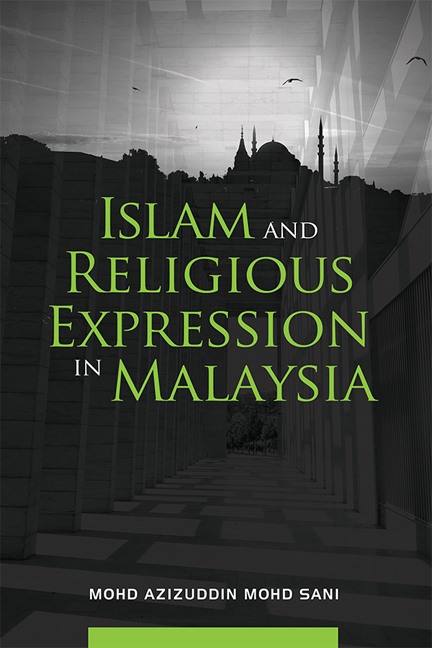Book contents
- Frontmatter
- Cantents
- Foreword
- Preface
- Acknowledgements
- List of Acronyms and Abbreviations
- 1 Freedom of Expression
- 2 Islamization Policy and Islamic Bureaucracy
- 3 Inter-Religious Expression
- 4 Intra-Religious Expression
- 5 Extreme Expression and Radicalization
- 6 New Malaysia under Pakatan Harapan
- 7 Conclusion: Seeking for a Genuine Freedom of Religious Expression
- Bibliography
- Index
- About the Author
2 - Islamization Policy and Islamic Bureaucracy
Published online by Cambridge University Press: 10 November 2020
- Frontmatter
- Cantents
- Foreword
- Preface
- Acknowledgements
- List of Acronyms and Abbreviations
- 1 Freedom of Expression
- 2 Islamization Policy and Islamic Bureaucracy
- 3 Inter-Religious Expression
- 4 Intra-Religious Expression
- 5 Extreme Expression and Radicalization
- 6 New Malaysia under Pakatan Harapan
- 7 Conclusion: Seeking for a Genuine Freedom of Religious Expression
- Bibliography
- Index
- About the Author
Summary
Introduction
Considerable restrictions over certain types of religious expression practices in Malaysia imply the State's subtler and consistent intention not only to maintain racial and religious harmony within the country's multiethnic society, but also ultimately to protect the sanctity of Islam. Safeguarding the primacy of Islam as the official religion of the Federation serves as raison d’etre for the Malaysian government and state-religious authorities to carry out Islamization policies and programmes in which Islamic values, principles, laws and systems are integrated into every aspect of national life.
Within the broader context of domestic political landscape, the impetus for Islamization coincided with the deliberate tactical political measures employed by the UMNO-led ruling government to continue to remain in power amidst the background of burgeoning socio-political climate oriented towards Islamic primacy and conservatism which emerged since the 1970s. Hence, this chapter explores and examines the characteristics of state-driven Islamization policy in Malaysia and its historical narrative development. Greater attention will also be paid to the driving factors of and socio-politico ramifications arising from this policy. An understanding of the government's intents, rising Islamic revivalism and the existing national constitutional and legislative framework offer some insights into why the State acted in such ways.
Historical and Contemporary Background of Islamization Policy: An Overview
The origin of Islamization policy in Malaysia can be traced back to the early 1960s. Nevertheless, historical accounts of the early period following the post-independence Malaya reveal that the signs of Islamization process were already visible. The country's first Prime Minister Tunku Abdul Rahman paved the way by establishing the Muslim Welfare Organisation of Malaysia (PERKIM: Persatuan Kebajikan Islam Malaysia). Since its establishment in 1960, PERKIM has been a “non-partisan” da’wah organization entrusted to care for recent converts to Islam and to educate the Muslims about Islam. Even so, it was during the period between the 1970s and the 1980s that the policy had gained impetus with the steadily revival of political Islamist movement in the country. During this period, social, legal and political Islamization process in Malaysia coincided and, to a significant extent, was influenced by a landmark of geopolitical events unfolded outside the country—the Iranian Revolution of 1979–82 and revivalism of conservative Islamism in sub-Indian continent.
- Type
- Chapter
- Information
- Islam and Religious Expression in Malaysia , pp. 25 - 64Publisher: ISEAS–Yusof Ishak InstitutePrint publication year: 2020

